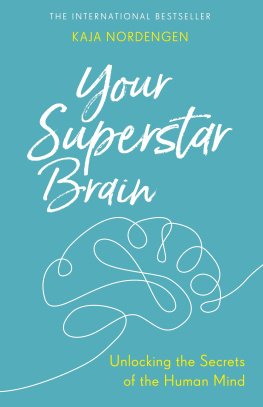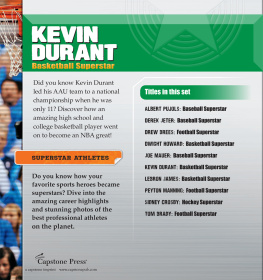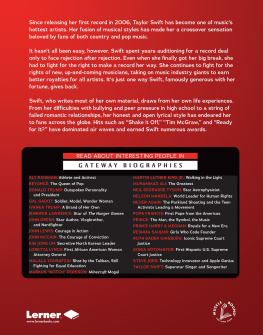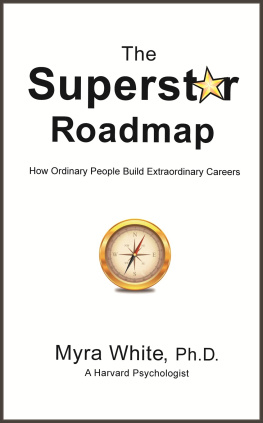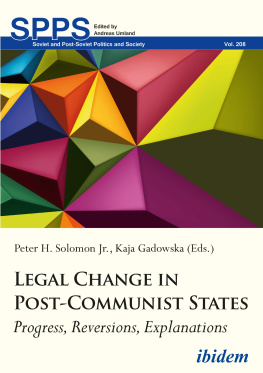Kaja Nordengen - Your Superstar Brain
Here you can read online Kaja Nordengen - Your Superstar Brain full text of the book (entire story) in english for free. Download pdf and epub, get meaning, cover and reviews about this ebook. year: 2018, publisher: Piatkus, genre: Religion. Description of the work, (preface) as well as reviews are available. Best literature library LitArk.com created for fans of good reading and offers a wide selection of genres:
Romance novel
Science fiction
Adventure
Detective
Science
History
Home and family
Prose
Art
Politics
Computer
Non-fiction
Religion
Business
Children
Humor
Choose a favorite category and find really read worthwhile books. Enjoy immersion in the world of imagination, feel the emotions of the characters or learn something new for yourself, make an fascinating discovery.
- Book:Your Superstar Brain
- Author:
- Publisher:Piatkus
- Genre:
- Year:2018
- Rating:4 / 5
- Favourites:Add to favourites
- Your mark:
- 80
- 1
- 2
- 3
- 4
- 5
Your Superstar Brain: summary, description and annotation
We offer to read an annotation, description, summary or preface (depends on what the author of the book "Your Superstar Brain" wrote himself). If you haven't found the necessary information about the book — write in the comments, we will try to find it.
Your Superstar Brain — read online for free the complete book (whole text) full work
Below is the text of the book, divided by pages. System saving the place of the last page read, allows you to conveniently read the book "Your Superstar Brain" online for free, without having to search again every time where you left off. Put a bookmark, and you can go to the page where you finished reading at any time.
Font size:
Interval:
Bookmark:
Published by Piatkus
ISBN: 978-0-349-41720-2
Copyright 2018 Kaja Nordengen
The moral right of the author has been asserted.

This translation has been published with the financial support of NORLA
Illustrations by Guro Nordengen
Photograph on Geir Mogen; edited by Birte Nordengen
All rights reserved. No part of this publication may be reproduced, stored in a retrieval system, or transmitted, in any form or by any means, without the prior permission in writing of the publisher.
The publisher is not responsible for websites (or their content) that are not owned by the publisher.
Piatkus
Little, Brown Book Group
Carmelite House
50 Victoria Embankment
London EC4Y 0DZ
www.littlebrown.co.uk
www.hachette.co.uk
Kaja Nordengen is a brain researcher and physician specialising in neurology at Akershus University Hospital. She has a PhD in neuroscience and also teaches at the University of Oslo.
T he brain is the most wondrous, complex and mysterious organ we know. As a psychology student in the 1980s, I was taught that the cause of autism in children was an emotionally cold mother. Today we know better. Autism is due to a developmental change in the brain, which brings a multitude of factors into the picture.
For me, this memory of my student days serves as a reminder of how quickly our knowledge has developed within the field of brain research. We should rejoice at the progress being made, but we should also remain humble when it comes to recognising the role that modern technology plays in making this new knowledge possible. Many of the big research questions of our day are the same ones that people have been asking for centuries. However, thanks to the development of ground-breaking research tools and methods, we are now able to look for the answers to these questions in the brain itself. We are standing on the threshold of a knowledge revolution in terms of the brain and its interaction with the body, genetics and the environment.
But its not enough to collect research data in laboratories and share the results internationally with colleagues. The knowledge has to be conveyed beyond professional settings to society at large, where it may be incorporated into peoples lives and translated into insight and understanding. To understand how our brain functions and how it participates in all of the bodys processes is to understand our capabilities and who we are as human beings.
Greater knowledge also leads to superior means of evaluation and treatment when something goes wrong in the brain. We now understand the importance of separating the symptoms of a brain disorder from the persons character and personality. We know that the symptoms are due to a failure in the system. Armed with greater knowledge about how the healthy brain functions, researchers can proceed to look for where in its processes the failure has occurred and how it may be repaired. This insight provides the basis for largesse and willingness to adapt, which are essential for everyone to have a place in society.
In this book, Kaja Nordengen presents an accessible introduction to the most recent research into the organisation, mechanisms and functions of the brain. Writing in an engaging manner, she interweaves the results of this research with anecdotes from her own life. By anchoring theory in concrete experiences that are part of our shared world, she not only conveys facts but stimulates curiosity. The playfulness in the way she presents the material awakens the sort of enthusiasm that drives both the questioning child and the experienced adult. The warmth of Kajas narrative voice is sure to stay with every reader long after they have closed her book.
The excellent illustrations were drawn by the authors younger sister, Guro Nordengen. Once again, I suspect that readers will remember these clear, simple drawings for many years to come, which is not usually the case with sophisticated 3D graphics. They mirror the text by encouraging further contemplation and general understanding rather than attempting to present every minute detail.
I would like to thank Kaja Nordengen for daring to take on this bold and ambitious project. Her tireless efforts mean that some of the most important advances in brain research are now accessible to a broad cross section of readers, both young and old.
W hen the ancient Egyptians embalmed their dead rulers in preparation for the afterlife, the heart was carefully removed before being placed back inside the body. Meanwhile, the brain was simply discarded. A stick was poked up the nose, the brain matter was whipped into mush, then it was sucked out. The brain became trash. It would be a long time before humans understood that we are who we are because of our brains.
Even before recorded history, the brain was sometimes linked to functions such as movement and thinking. Yet it would be several thousand years before people generally accepted that I is situated within the brain. Aristotle and several other great classical thinkers, for example, believed that the soul was to be found in the heart. It was only in the mid-seventeenth century that the French philosopher Ren Descartes proposed a different hypothesis.
Almost everything on each side of the central line that divides the brains two halves has a corresponding feature on the opposite side. For instance, we have a left and a right frontal lobe. Yet Descartes noticed that the pineal gland was located in the very centre, so he identified this as the seat of the human soul. But it wasnt quite that simple. In 1887, the Arctic explorer and Norways first brain researcher Fridtjof Nansen correctly postulated that intelligence lies in the brains numerous neural synapses. Since his day, we have learned that joy, love, contempt, memory, knowledge, musical taste and every other human preference are also located in these neural synapses.
Since every trait that makes up I exists in the brain, clearly you could not have become you without your brain. Our laws also recognise that the brain is the principal determining factor for what constitutes life: if you are brain dead, then you are dead. Provided that permission has been granted, your organs can then be removed and transplanted to save someone elses life. There are few organs that we can manage without, yet the heart, liver, lungs, kidneys and pancreas are all replaceable, as long as a suitable donor can be found. But no one has yet attempted to transplant a human brain into another body.
Even when the technical challenges of doing so have been overcome, significant ethical dilemmas will remain. If someone who is brain dead receives a new brain, the person associated with that particular body will no longer be the same I. She may look like your daughter; but if she has someone elses brain, is she really your daughter? She will have a completely different consciousness alternative thoughts and dreams. We cannot replace the brain without also replacing the person. In other words, the brain is our only irreplaceable organ.
In this book, we will explore the mysteries of the brain everything from what happens when we fall in love to where to find the I. Lots of interesting questions arise when we talk about the brain. Who are you? What makes you who you are? What is personality? What is free will? Where do our thoughts originate? We already have some clear answers or at least some clear indications from patient histories and advances in brain research. Nevertheless, many mysteries remain, so we must hope that further research and bright minds will find more answers in the years to come. After all, the brain is the only organ that can research itself.
Font size:
Interval:
Bookmark:
Similar books «Your Superstar Brain»
Look at similar books to Your Superstar Brain. We have selected literature similar in name and meaning in the hope of providing readers with more options to find new, interesting, not yet read works.
Discussion, reviews of the book Your Superstar Brain and just readers' own opinions. Leave your comments, write what you think about the work, its meaning or the main characters. Specify what exactly you liked and what you didn't like, and why you think so.

